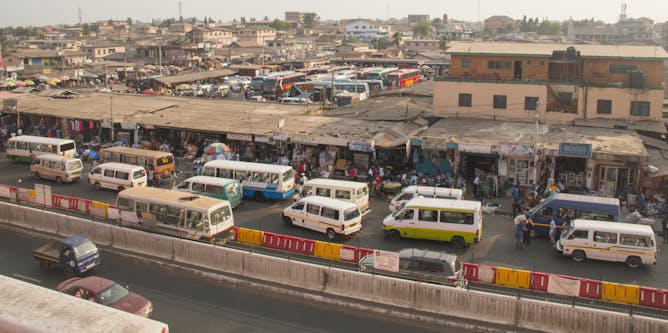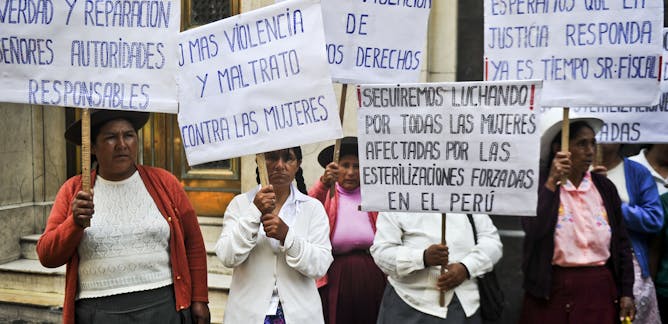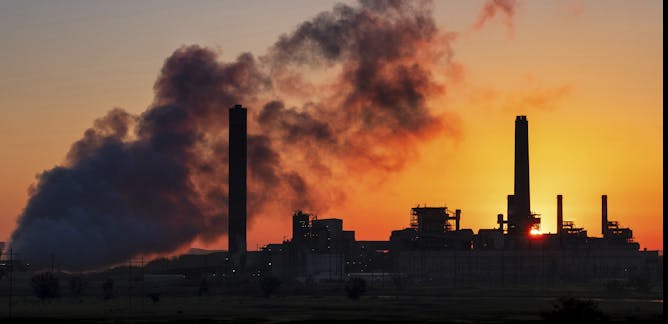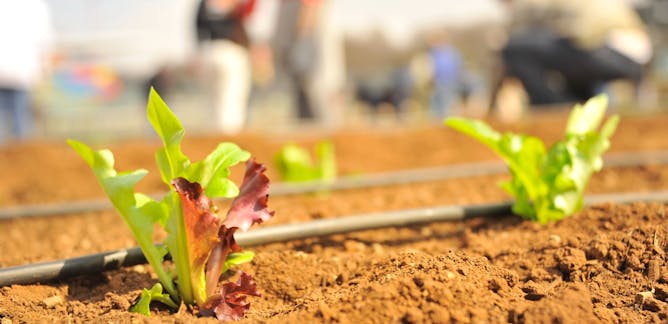|
|
|
|
It has been 10 years since nationwide protests led to the ousting of Tunisian President Zine El Abidine Ben Ali and his regime. Ben Ali led Tunisia for 23 years. The revolution was driven by unemployment, food inflation, corruption, lack of political freedom and poor living conditions in the country. However, little has changed since, and the country continues to be hit by waves of mass protest. Saerom Han, Andrea Teti and Pamela Abbott describe how, rather than pursuing the goals of the revolution, the government rediscovered bad old habits and ignored dissent.
Minibuses move millions of people around Africa’s many cities, under various names: daladalas in Dar es Salaam, danfos in Lagos and tro-tros in Accra. The drivers of these vehicles are blamed for a great deal of reckless driving on the continent’s roads. They are, therefore, often targeted by law enforcement agencies. Festival Godwin Boateng explains what motivates tro-tro drivers’ behaviour in Ghana, and why, if Africa’s roads are to be made safer, it is important not to ignore the systems and constraints within which they work.
|
Moina Spooner
Commissioning Editor: East and Francophone Africa
|

|
|

Tunisian demonstrators gather during a protest in Tunis, Tunisia on February 06, 2021.
Photo by Yassine Gaidi/Anadolu Agency via Getty Images
Saerom Han, University of Aberdeen; Andrea Teti, University of Aberdeen; Pamela Abbott, University of Aberdeen
Since the revolution, Tunisians’ call for "bread, freedom and social justice" have fallen on deaf ears.
|

A bus and tro-tro station in Accra, Ghana.
nicolasdecorte/Shutterstock/Editorial use only
Festival Godwin Boateng, Columbia University
A range of factors influence the behaviour of minibus drivers in Ghana. This involves a complex web of factors, motivations and constraints.
|
Politics + Society
|

Ñusta Carranza Ko, University of Baltimore
Forced sterilization of Indigenous women was a covert part of 'family planning' under Fujimori. Over 200,000 Peruvians underwent tubal ligations between 1996 and 2001 – many without their consent.
| |

Jeffrey Fields, USC Dornsife College of Letters, Arts and Sciences
Saudi's crown prince approved the killing and dismemberment of a Washington Post columnist in 2018, the Biden administration says. So how can the US still see the Saudis as good partners?
|
|
|
Podcast
|

Gemma Ware, The Conversation; Daniel Merino, The Conversation
Plus, new discoveries about early humans in Tanzania's Olduvai Gorge. Listen to episode 5 of The Conversation Weekly podcast.
| |

Vinita Srivastava, The Conversation; Anowa Quarcoo, The Conversation; Ibrahim Daair, The Conversation
When COVID-19 first appeared, some called it the great equalizer. But the facts quickly revealed a grim reality: COVID-19 disproportionately impacts racialized communities.
|
|
|
Science + Technology
|

Patrick Koppenburg, Dutch National Institute for Subatomic Physics; Harry Cliff, University of Cambridge
The theory of tiny particles isn't complete. But new discoveries are helping scientists expand it.
| |

Pep Canadell, CSIRO; Corinne Le Quéré, University of East Anglia; Glen Peters, Center for International Climate and Environment Research - Oslo; Matthew William Jones, University of East Anglia; Pierre Friedlingstein, University of Exeter; Robbie Andrew, Center for International Climate and Environment Research - Oslo; Rob Jackson, Stanford University; Steve Davis, University of California, Irvine
The global pandemic caused an unprecedented drop in global emissions. But this is likely to rebound as economies start to recover.
|
|
|
En Français
|

Xavier Hollandts, Kedge Business School
Dans un secteur agricole en plein questionnement face aux défis conjugués du changement climatique et des attentes sociétales, des tendances se dessinent.
| |

Xuejian Wu, Rutgers University - Newark
La physicienne sino-américaine a travaillé sur le Projet Manhattan et mené des expériences novatrices durant sa longue carrière.
|
|
|
| |
| |
| |
| |
| |
| |
|
|
|
|
|
|
|